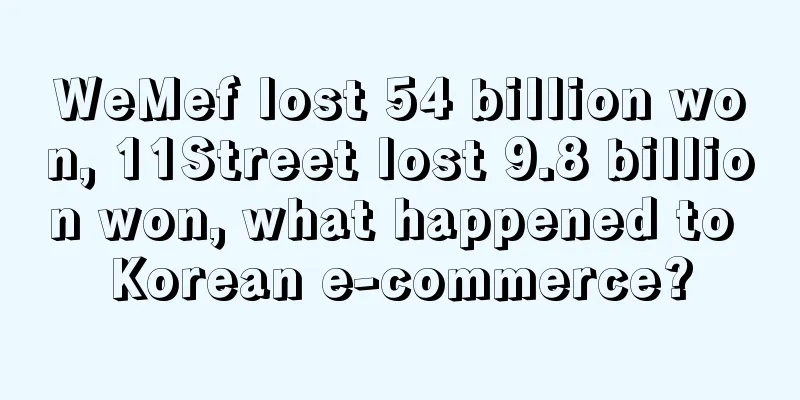WeMef lost 54 billion won, 11Street lost 9.8 billion won, what happened to Korean e-commerce?

|
South Korea's online shopping market has grown rapidly due to the increased demand for non-face-to-face shopping caused by the new coronavirus, but some e - commerce companies are still losing money . Despite the expansion of the market size, the number of operators has also increased, and competition in South Korea's e-commerce is becoming increasingly fierce .
According to data released by the National Statistics Office on the 4th , South Korea 's online shopping transactions last year amounted to 16.11 trillion won, an increase of 19.1% from 2019 , with transactions for catering and household goods also increasing to 48.3% and 44.1% respectively .
Last year, mobile transactions also exceeded 100 trillion won for the first time , with mobile shopping transactions reaching 10.87 trillion won, up 24.5%, a record high.
However, most e-commerce companies are facing losses because some companies have made large-scale investments in order to monopolize the market.
WeMef announced on the 3rd that its sales last year reached 386.4 billion won, a 17% decrease from the previous year, and its operating loss was estimated at 54 billion won.
A Wemef official said: “Due to the epidemic, overall sales have increased, but most of them are concentrated in daily necessities and food, while sales in areas such as fashion and travel, where the company has an advantage, have decreased.”
For 11Street, sales increased 2.8% from last year to 545.6 billion won, but operating income was a loss of 9.8 billion won . Although sales increased slightly due to increased non-face-to-face demand, the company had difficulty controlling costs due to declining performance in the travel and fashion industries and the state of emergency in South Korea , resulting in an operating deficit.
An 11Street official said: "As the demand for online shopping increases, the e-commerce industry has also benefited. The demand for daily necessities and food has surged, but the demand for fashion , beauty, travel, and accommodation has dropped significantly. In order to stand out from the crowd of e-commerce platforms, a large amount of marketing expenses have been increased, resulting in increased costs. "
In addition, industry insiders predict that Coupang will have accumulated a deficit of 4.5 trillion won as of last year. However, there are some data showing that Coupang's transaction volume increased significantly last year, and the proportion of products purchased directly through Rocket Delivery was higher than other companies .
An industry insider said: " South Korean e-commerce companies have benefited from the epidemic , but in fact , except for large companies, the performance of many companies is lower than expected. 2020 is both a growth and crisis for the e-commerce industry. As the market expands, the number of e-commerce companies is also increasing. Companies should continue to accumulate experience, improve their competitiveness, and get a share of the e-commerce market."
South Korea E-commerce Loss |
>>: Canadian consumers' demand for beauty products is rising! High-end products are popular
Recommend
Big news! Shopee opens Brazilian site, locals love Chinese products
Join Shopee Brazil and enjoy 3 months of commissi...
It’s hard to bear! Amazon’s “Business Scope” review is coming again…
Amazon sellers have been worried about sudden rev...
More than 50% of South Koreans believe that vaccination is a social responsibility
Yonhap News Agency reported in Seoul on March 2 t...
Global luxury brands are accelerating their embrace of Tmall, opening a flagship store on average every week
" By 2025, or perhaps even by 2022, one in e...
Amazon does not have a price advantage in Germany, new survey shows
SWR selected 816 products from Amazon for analysi...
A large number of operators are considering switching platforms
Job hunting season is also a season of confusion!...
Germany strictly enforces environmental protection policies, sellers of electronic appliances need to pay attention!
According to the European Commission, the newly r...
What is SimilarWeb
Similarweb is a very powerful market competition a...
AirAsia partners with RinggitPlus financial comparison site to launch AirAsia Money
AIRASIA Group Bhd has partnered with RinggitPlus,...
The storm hit, and at least 26 containers of the cargo ship fell into the sea...
The storm was strong and the cargo ship was in tr...
What is Hootsuite? Hootsuite Review, Features
Hootsuite is a Canadian social media management p...
Continuing to increase domestic supply chain, SHEIN Bay Area Smart Industrial Park was officially delivered
On February 11, reporters learned that the "...
What is Chewy? Chewy Review, Features
Founded in 2011 and headquartered in Florida, Che...
What is quatat-tattoo-supply? quatat-tattoo-supply Review, Features
quatat-tattoo-supply Tattoo Equipment Manufacturin...
What is Amazon Aggregator? Amazon Aggregator Review, Features
Amazon Aggregator is focused on fostering a vibran...









